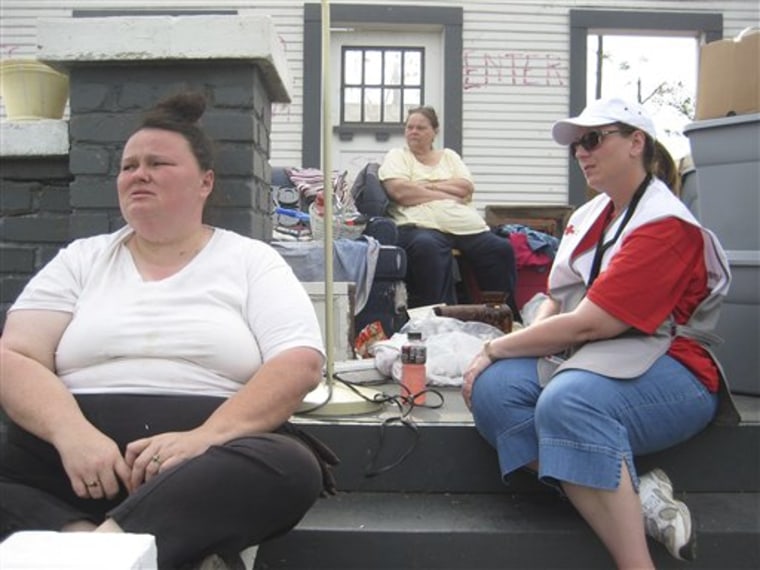The 7-year-old girl plugged her ears and shook her head as her mother told a Red Cross social worker about their brush with death. Nakarah Britt didn't want to relive the terror of a tornado bearing down on their Birmingham apartment.
A few blocks away, Rosalee Taylor was having trouble eating and sleeping.
"I can't say I'm holding up," she said as family members picked over the remains of her flattened house, "but I'm holding on."
The twisters that clobbered the South about a week and a half ago, reducing entire neighborhoods and towns to rubble and killing hundreds, also left emotional wreckage. Storm survivors are just beginning to get over the initial shock of having lived through the deadliest cluster of tornadoes since the Depression. As reality sets in, some of them will experience grief, anger, anxiety and helplessness in the coming months.
A small army of therapists has been sent to hard-hit areas throughout Alabama, setting up shop in mental health centers and emergency shelters and heading out to ruined neighborhoods to help people cope with the loss of loved ones, the destruction of homes and possessions, and the monumental task of rebuilding.
"The need for counseling and crisis intervention is going to rise dramatically. And it'll be ongoing," said Zelia Baugh, Alabama's commissioner of mental health.
Baugh's agency and the University of Alabama are temporarily offering free crisis counseling at Bryce Hospital and other locations in hard-hit Tuscaloosa, staffed by university faculty and graduate students. Community-based mental health centers throughout Alabama, meanwhile, have been authorized to hire as many temporary counselors as they need, with the federal government picking up the tab. They're being supplemented by volunteers arriving from around the country.
Last week, a Red Cross mental health team toured hard-hit areas in the Birmingham area, ready to lend a sympathetic ear and comforting words.
In their bright red vests were Suzanne Rudolph, 54, a psychiatric nurse from Charlotte, N.C., along with Susan Connors, 67, a retired social worker from Madison, Wis., and Linda Coordes, 39, a social worker from Kelso, Wash.
Rudolph knows first-hand how small gestures of support can make a big difference. She began volunteering in disaster zones after watching her own home burn to the ground in 1996. A Red Cross worker sat with her all night, holding her hand as she sobbed.
"He never had to say a word. It was just the comfort that he was there. That's all we offer: A friendly face, some comfort, some water, 'Hey, is everything OK, have you got a place to stay, is there anyone I can call for you?'"
In the Birmingham suburb of Pleasant Grove, the volunteers found Lorraine Beasley, 55, sitting on the porch of her roofless house.
Beasley said she has cried every day.
"I saw them taking bodies out," she told Coordes.
"That's just something you should not have to see," Coordes said, putting her hand on Beasley's arm.
"Two of them were small," Beasley added.
"I'm so sorry."
Coordes urged her to seek help. Beasley said she'd be OK — that her faith would see her through.
Most people in the devastated Pratt City section of Birmingham also seemed to be holding up well, comforted, perhaps, by the overwhelming presence of relief workers, police and National Guard, insurance adjusters, utility workers and Samaritans bearing food, water and supplies. A festive block party helped lighten the mood.
But mental health experts say that grief often doesn't truly set in until weeks or even months after a disaster.
"It's later that the body and the brain allow us to move to the next stage of trauma recovery, a more emotional stage. The reality of what happened hits you and there's a huge grief process that goes on with that because there's a huge loss," said Beverly Thorn, chairwoman of the University of Alabama's psychology department.
She added that some victims handle the grieving stage better than others.
People who deal with it emotionally in little pieces, not avoiding it completely but not getting overwhelmed by it all at once, seem to do better, Thorn said.
Gaye Vance, president of the Alabama Psychological Association and a psychologist in private practice, said most tornado victims will be too busy dealing with their immediate needs to think about seeing a therapist right now. But she expects to see an increase in people seeking counseling in three to six months.
"It might be a lot of anxiety, intrusive thoughts or memories of the event, sleep difficulties, concentration," she said. "In children, insecurity, acting out, loss of focus and decreasing grades."
She advised parents to limit their children's access to TV images of the tornado. Even kids who weren't directly impacted can become fearful and anxious if they see too much.
In Pratt City, 7-year-old Nakarah Britt didn't have to watch the tornado on television. She lived it.
Nakarah and her mother, Nakia Britt, barely made it into a closet when the funnel cloud struck, blowing out windows and ripping apart walls of their apartment. Nakarah shook in her mother's arms, crying uncontrollably as the tornado raged around them. "Jesus, Jesus, Jesus, it's not time for us. We're not ready yet," Britt prayed.
They escaped injury. But it was a traumatizing experience, one Nakarah would just as soon forget.
Coordes, the Red Cross volunteer, who had stopped at a storm-damaged house where Britt was braiding her daughter's hair, noticed the little girl putting her hands over her ears while Britt told their story.
"Can I have a hug?" the social worker asked. Nakarah jumped into her arms. Later, her face lit up when Coordes returned with a coloring book and crayons.
Britt herself hasn't gotten much sleep, and she's startled by loud sounds, such as the rumble of a National Guard convoy.
So far, she hasn't cried.
"I might," Britt said. "But not yet."
